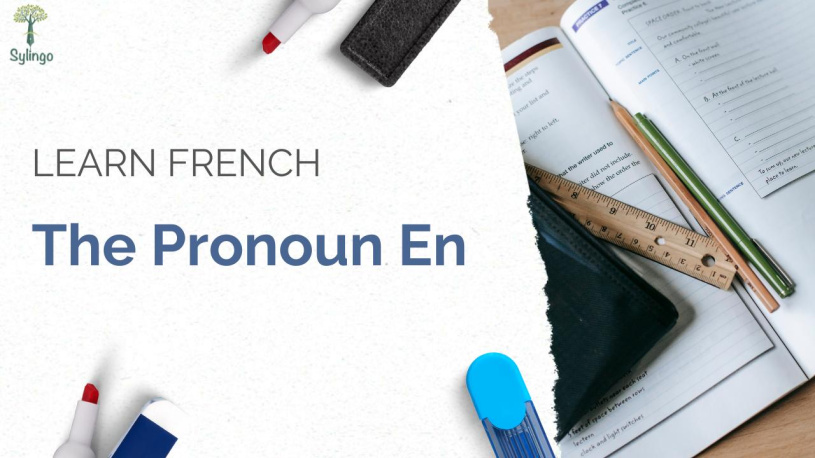In this lesson, we will explore the versatile pronoun "en" in French, its various uses, and how to use it correctly in sentences.
Usage of "en":
-
The pronoun "en" replaces nouns, verbs, or adjectives that we do not want to repeat.
-
The pronoun "en" replaces a verb followed by the preposition "de," an adjective followed by the preposition "de," or a place name preceded by the preposition "de."
-
We use the pronoun "en" to express a specific or unspecified quantity using "a partitive article," partitive pronouns, or "an indefinite article" with an undefined pronoun.
-
The pronoun "en" is used in French to replace phrases introduced by "de" (some, any, of it, of them) and to indicate quantity, origin, possession, or partitive articles.
1- Using the pronoun "en" with the preposition "de":
1- The pronoun "en" replaces a verb followed by the preposition "de":
Verbs followed by the preposition "de":
|
to talk about |
parler de |
|
to dream of |
rêver de |
|
to take care of |
s'occuper de |
|
to need |
avoir besoin de |
|
to want |
avoir envie de |
|
to remember |
se souvenir de |
Examples:
- Tu as envie de glace? - Do you want ice cream?
- Oui, j'en ai envie. - Yes, I want some.
Note: If it comes after "parler de" with people, we use the personal pronouns (les pronoms toniques) and not the pronoun "en".
Examples:
Il parle de son fils? (Is he talking about his son?)
Oui, il parle de lui. (Yes, he's talking about him.)
2- We use the pronoun "en" with adjectives followed by the preposition "de":
- être content de (happy about)
- être fier de (proud of)
- être triste de (sad about)
Examples:
Est-ce que tu es content de le voir? (Are you happy to see him?)
Oui, j'en suis très content . (Yes, I am very happy.)
3- The pronoun "en" replaces a place name preceded by the preposition "de":
Example:
Elle revient du cinéma? (Did she come back from the cinema?)
Oui, elle en revient maintenant. (Yes, she is back from there (from the cinema).)
2- Using the pronoun "en" with quantity:
Examples:
Tu bois du café? (Do you drink coffee?)
Oui, J’en bois tous les jours. (Yes, I drink it every day.)
Tu achètes de la salade? (Do you buy salad?)
Oui, j'en achète. (Yes, I buy it.)
J'ai des pommes. → J'en ai. (I have some apples. → I have some of them.)
3- Using the pronoun "en" with origin:
Example:
Je viens de Paris. → J'en viens. (I come from Paris. → I come from there.)
4- Using the pronoun "en" with possession:
Example:
Ce livre est à moi. → C'est le mien. (This book is mine. → It's mine.)
5- Using the pronoun "en" with partitive articles:
Example:
Tu veux du thé? → Oui, j'en veux. (Do you want some tea? → Yes, I want some.)
Exercises:
A. Translate the following sentences into French using "en":
- I have some books.
- She comes from Spain.
- Do you want some bread?
B. Fill in the blanks with the appropriate form of "en":
- Il y a des fleurs dans le jardin. J'_____ ai cueilli.
- Tu as acheté des croissants? Oui, j'_____ ai acheté.
4. Correction:
A.
- J'ai des livres. → J'en ai.
- Elle vient d'Espagne. → Elle en vient.
- Veux-tu du pain? → Oui, j'en veux.
B.
- Il y a des fleurs dans le jardin. J'en ai cueilli.
- Tu as acheté des croissants? Oui, j'en ai acheté.
The pronoun "en" in French is a versatile tool used to replace phrases introduced by "de" and to indicate quantity, origin, possession, or partitive articles. By understanding its various uses and practicing with examples and exercises, you can confidently incorporate "en" into your French sentences.





